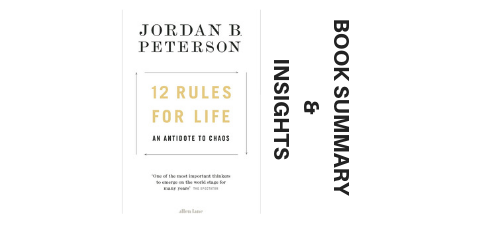12 Rules For Life (2018) Book Summary & Insights
Book Title: 12 Rules for Life
Subtitle: An Antidote To Chaos
Publication Date: 2018
Author Name(s): Jordan B. Peterson
About The Author
Jordan Peterson is a professor of psychology at the University of Toronto, clinical psychologist, and cultural critic. He came into public eye in 2016 after he released a series of YouTube videos criticising political correctness and the Canadian government’s Bill C-16.The act added gender identity as a prohibited ground of discrimination, which Peterson characterised as an introduction of compelled speech into law.
Peterson has received huge support and criticism for his criticism of political correctness which range over issues such as postmodernism, postmodern feminism, white privilege, cultural appropriation, and environmentalism. He considered the universities in Europe and North America to be most responsible for the wave of political correctness that has spread around Europe and North America and which is killing intelligent discus in favour of ideology.
His videos have been watched by millions of people around and his events are usually full with people eager to listen to what he has to say.
Book Summary
Walking through life, it might be difficult to find a balance between the delicate issue of order and chaos and our knowledge of right and wrong. Jordan Peterson strives to resolve most modern-day issues from his unique standpoint in this book.
The book is a thoughtful take on life with bits of religion, history, philosophy, politics, and the animal kingdom.
Who is This Book For?
Students of psychology, readers seeking meaning in their lives and interested in the lessons of mythology
Buy Book: Support The Book Author(s) And Our Work
Great books should be read, studied, and reviewed frequently, so reading the actual book may provide more value to you than the book insights on this page. Besides, this would support the work of the book author and what we do on LarnEdu. What could be better?
Important Notes
We get a small compensation from Amazon when you visit your nearest/local Amazon site via our affiliate link to purchase an item within 24 hours or if you add it to your cart and checkout within 90 days. This is no additional cost to you and supports our work.
The information on this page is meant to supplement the actual book(it is not a book review but distils the key insights or ideas from the book in under 5000 words). The content creator or LarnEdu does not necessarily support the views, thoughts, and opinions expressed in the text/book. Reasonable skepticism should be applied with any views, thoughts or opinions expressed/shared by the book author or content creator.
Reading the contents of this page does not guarantee specific results. The best lessons are achieved from taking consistent action in the real world rather than being addicted to the illusion of progress by getting stuck on reading an infinite amount of books or book summaries and insights. LarnEdu and the content creator accepts no responsibility or liability for the accuracy of the information on this page or how it is used.
Book Insights

Introduction
Our universal longing for understanding is obvious in our more modern taste for self-help reads. And, our appreciation to philosophers of the past like, Aristotle and Socrates. Jordan Peterson takes this yearning and goes on his own quest to find and highlight those 12 rules human beings must follow to navigate the chaos of the world today.
What makes his book different from any other self-help book? Peterson uses the unexpected to convey his meaning — how a lobster can stand for confidence, how a lotus flower represents the pursuit of life’s meaning.
The author’s take on this political and social issues may be controversial but, he is after one thing: balance between order and chaos in the world.
The first series of insights on the book is about animal hierarchy, self-love, and progressive thinking.
Head High, Back Straight; Stand Like A Winner
This chapter delves into the phenomenon called “the pecking order” and explains to readers how self-esteem and confidence can affect a person’s physical stature. Norwegian zoologist Thorleif Schjelderup-Ebbe created the phrase. He noticed that when scattering feed to the chickens, the strongest and biggest were the first to peck, leaving the smallest and weakest chickens to peck at the scraps and leftovers. Similar is the case of the lobsters. Lobsters fight aggressively for a space to call their own and, we often notice the winners to be bigger than those defeated. Scientists have said we can link the physical change to the winning lobsters having more levels of the hormone serotonin in their brains while the losers have increased levels of octopamine. Both chemicals can affect the posture of the lobsters.
The lobsters are just a metaphor for human self-esteem. Typically, a person with lower self-esteem or stuck in depression will curl up, translating into a slouch.
So, hold your head high and strike the posture of a winner.
Don’t Make Compromises With Your Health
We have found humans to be less concerned about their own health than that of a loved one. For example, no pet owner would make compromises with the prescription their vet has given them but, watch what happens when that person falls ill. Rarely is the advice of the doctor ever taken as seriously when he/she is the one whose health is at stake.
This begs the question, “Why do we care more for loved ones than we do ourselves?” Theories suggest that this human predisposition dates as far back as the Biblical Adam and Eve, and our need to punish ourselves as sinners. But, does the tale of Adam and Eve and the serpent have to inflict just negativity and self-loathing? We can also view the tale as a perfect example of the duality of nature. Where there is order, chaos exists and likewise. It leaves finding perfect balance, creating harmony.
Choose Your Friends Wisely, Avoid Negative Companions
The author cites his childhood friend for reference in this chapter. His friend remained in their hometown of Fairview, Alberta, and got sucked into the company of the town’s ne’er-do-well. With each visit to his hometown, Peterson noticed a downslide in his friend’s behaviour; attributing it to the negative company he kept.
Similarly, life throws you good and bad people. Someone might interpret it as you being snobbish or uptight but, it’s always important to pick your friends carefully and keep your circle close. The influence of a bad friend is more effective than you think. Surround yourself with supportive friends who build you up and reject any notions of negativity you may have and, be sure to do the same for them.
Do not compare yourself to others but to who you were yesterday
Modernisation and the embrace of technology have allowed people to outgrow being too small for certain goals or downsizing their abilities. Basically, we need to understand, that someone somewhere is better than you. We can thank the internet for making that glaringly obvious. The understanding could make it easier to fall into depression or lose self-esteem but, the author encourages us to not look at things that way.
Self-criticism is important; yes, we need to push ourselves to be the best version we could be. This does not mean that you should berate yourself too hard. When self-criticism turns into a hateful form of critique, there the harm is.
We should not look at where others seem to have their lives at but, look at the progress we have made in our own lives.
When you compare your life at the moment to where it had been five years ago, you make more obvious the improvements you have made; no matter how little.
The next series of insights from the book are on parental responsibility, trudging on, and truthful living.
Do The Right Thing As A Parent And Raise A Kind, Productive Child
It is often easy to question another parent’s choices on how they raise their child; wondering if they have everything under control or if they are downright bad parents.
When comparing the child-rearing techniques from the eighteenth century and today, it is easy to see exactly how widely humans have deviated from more popular takes on parenting. Modern understanding claims that people need guidance to be gentler; born with more wild, aggressive instincts. Picture the chaos of a playground to the ordered tranquillity of a workplace.
Peterson believes that the responsibility really lies with the parents to tame their kids, and properly nurture them into a well-rounded, productive adult.
It’s hard to find a proper balance where you don’t appear the villain but, parents should not relate with their kids as just their “friend”. Always remember your children will keep pushing to see how far they can really get, you must stand firm and be decisive about your lines.
- Limit your rules but make them ironclad
- Apply minimum necessary force
- Work as a united front
Never Play The Victim — Don’t Blame Others For Your Ill Luck
This is a fairly simple but hard rule to follow; don’t bemoan your fate and blame others for your hardships. Life can hand you such a turn sometimes that drastic retaliatory measures might seem as the only reprieve.
Leo Tolstoy, a Russian author, has suggested that we can only respond to the absurdity of human existence with one of these four ways–hedonistic pleasure, suicide, childlike ignorance, or trudging on despite everything. In the Russian author’s opinion, suicide is the most honest response of the four. We portray his analysis in today’s happenings, with thousands of murder-suicides happening in the United States.
Despite Tolstoy’s analysis, never avenge the world for its perceived unfairness. Accept whatever lot falls on you and do your best to make the most.
Make Sacrifices And Seek Meaning Over Immediate Pleasure
The author uses the tale of the monkey who got caught with his hand in an open jar to stress his point here. The meat of the story is that while the jar opening was just big enough for the monkey’s hand to slip in, removing the hand was impossible unless he let go of the treat.
Moral- greed always comes with a price. Just like many people sacrifice their own interests in the long run for simple, short pleasures. The examples of ways people do this are almost endless; alcoholism, binge eating, drug use, etcetera. The people who engage in these acts justify their actions by telling themselves things like; “we’re already in a sinking ship, what’s the point?”. We can look at the story of the monkey in two ways; greed and sacrifice. If the monkey had let go of his treats, he could have had something better for the future, freedom- freedom to steal another cookie another day. The Bible has a perfect replication with the story of Adam and Eve; God punished them so they could experience the sweetness of the afterlife as a reward for all their suffering.
Remember that the bigger the sacrifice you make the bigger reward. For example, working hard for an entire year to afford a family vacation–rewarding. Carrying a baby for 9 months and enduring hours of labour–very rewarding.
The lotus flower begins its life at the dark depths of the water and progresses steadily to the surface where it blossoms under the sun.
Lies Are Easy To Tell But, Make Efforts To Live Truthfully
We perceive truth as a valuable and enviable trait in society but; it is so rare to find a honest person. German philosopher Friedrich Nietzsche was of the belief we can measure a person’s spirit by how true they can live their lives.
Alfred Adler says one of the major lies people tell is “life-lies”; where we tell lies to turn what we think we want into a reality. An example is thinking far-fetched dreams about the future even while things get increasingly difficult, and more obstacles come between you and your idyllic thoughts.
We can consider this a positive mindset but, such thinking can often cloud our judgement and delude us into thinking we know it all, causing a refusal of any external ideas or thoughts.
You need not cut down on your ambitions to live a more truthful life. Allow room for changes if need be and don’t stay set in your thinking. Be truthful to yourself and let your goals change with your understanding.
The next series of insights from the book are on developing an open-minded simplicity, patriarchy and enjoying the small things in life.
Open Your Mind To New Knowledge During Conversations
Socrates is still renowned in the world today, thousands of years after the philosopher’s death. One of his most notable accolades is his proclamation that the only thing he was certain of was that he knew nothing.
Engaging in conversation with an open mind allows for more learning than going into a discussion with a firm mindset and unwillingness to learn. Compare it to intelligent thinking. When you think things over, you turn issues over in your mind, exploring it from both angles, creating internal dialogue.
Human dialogue often goes in this way. A child could get the idea to play on a roof and she suggests it to her friend. Her friend will then highlight the dangers of playing up on a roof, allowing the other child mull over her idea again from another perspective.
Good comes out of this open-minded conversation but, it doesn’t always go this way. Two people involved in a dialogue may be in it not to learn from the other person but, to trump the other party’s opinions and confirm their superiority. This blocks their ability to learn, with their minds preoccupied with thoughts of what next to say.
It might not be easy to allow something to sway yourself from your preconceived notions or have someone change what you thought was right with their knowledge. But, this openness is part of the process of growing up and we should embrace it.
We Should Confront The Complexity Of Life With Clear Language
It is far easier to treat and regard life in the easiest, most uncomplicated way possible. For example, an apple before you came from a branch which came out of a trunk, and a tree, and some roots etcetera. You don’t think of those when you see the apple; you think of just the apple.
Human beings pay attention to that which serves a purpose or stands in the way. The world in its layers is far too complex to understand; our mind takes things and processes them in the simplest versions. But sometimes, life gets chaotic and involves more complexity. Here, you must settle yourself and trace the root of your problems to lay them out in the most precise way possible.
Your life would run more smoothly with clear communication. The sooner you learn to be precise and honest in your approach, the easier you will find life.
We Must Avoid Suppressing Human Nature Even Though Bad And Oppressive Men Exist
The author expresses his opinion we build the hatred for patriarchy from Max Horkheimer’s school of thought. Horkheimer felt that intellectualism should be dynamic and influenced by societal changes and we should suppress ruling males, not “empower” women. He feels we should not set boundaries on the natural instincts of humans, believing that men can be provoked to ruthless aggression when their masculinity gets stifled for too long.
We Must Remember To Celebrate The Small Joys In Life, Life Is Full Of Hardships
The author uses his own life as an example here; his daughter has been living with arthritis since the age of six, going through many surgeries and constant pain.
Seeing a loved one suffer is enough to make you think life is against you. But, Peterson states that the small pleasures in life are much more appreciated in the face of so much sorrow and pain, and we often overlook good moments when there is little suffering to overcome.
Following this rule allows you to live life with a positive mindset, allowing room for an appreciation of the smallest things that come your way. Remember the balance between darkness and light, good and bad; order and chaos.
Key Quotes
“To stand up straight with your shoulders back is to accept the terrible responsibility of life, with eyes wide open. It means deciding to transform the chaos of potential into the realities of habitable order. It means adopting the burden of self-conscious vulnerability and accepting the end of the unconscious paradise of childhood, where finitude and mortality are only dimly comprehended. It means willingly undertaking the sacrifices necessary to generate a productive and meaningful reality (it means acting to please God, in the ancient language).”
“It took untold generations to get you where you are. A little gratitude might be in order. If you’re going to insist on bending the world to your way, you better have your reasons.”
“Intolerance of others’ views (no matter how ignorant or incoherent they may be) is not simply wrong; in a world where there is no right or wrong, it is worse: it is a sign you are embarrassingly unsophisticated or, possibly, dangerous.”
The claim that all gender differences are a consequence of socialization is neither provable, nor disprovable, in some sense, because culture can be brought to bear with such force on groups or individuals that virtually any outcome is attainable, if we are willing to bear the cost. We know, for example, from studies of adopted-out identical twins, that culture can produce a fifteen-point (or one standard deviation) increase in IQ (roughly the difference between the average high school student and the average state college student) at the cost of a three-standard-deviation increase in wealth. What this means, approximately, is that two identical twins, separated at birth, will differ in IQ by fifteen points if the first twin is raised in a family that is poorer than 85 percent of families and the second is raised in a family richer than 95 percent of families. Something similar has recently been demonstrated with education, rather than wealth.9 We don’t know what it would cost in wealth or differential education to produce a more extreme transformation.
What such studies imply is that we could probably minimize the innate differences between boys and girls, if we were willing to exert enough pressure. This would in no way ensure that we were freeing people of either gender to make their own choices. But choice has no place in the ideological picture: if men and women act, voluntarily, to produce gender-unequal outcomes, those very choices must have been determined by cultural bias. In consequence, everyone is a brainwashed victim, wherever gender differences exist, and the rigorous critical theoretician is morally obligated to set them straight. This means that those already equity-minded Scandinavian males, who aren’t much into nursing, require even more retraining. The same goes, in principle, for Scandinavian females, who aren’t much into engineering.What might such retraining look like? Where might its limits lie? Such things are often pushed past any reasonable limit before they are discontinued. Mao’s murderous Cultural Revolution should have taught us that
Conclusion
Jordan Peterson stresses the importance of finding order within the natural
chaos of life; which he tries to guide readers to with his 12 rules for life and provides enough illustration to enthral his readers.
Jordan Peterson teaches us that there is much to learn from lobsters and the natural hierarchy in the animal kingdom. It is important to find that all too delicate balance between darkness and light or risk falling too deeply into one end. The book teaches that some societal changes are welcome; such as the techniques implemented in raising a child, but we should give others more thought.
Since You’re Here…
Great books should be read, studied, and reviewed frequently, so reading the actual book may provide more value to you than the book insights on this page. Besides, this would support the work of the book author and what we do on LarnEdu.
You can also support the work we do at LarnEdu work by making a one/off or monthly donation(via PayPal) for as little as £0.99 or sharing this content.
Do you have any feedback or suggestions? Use the comment section below or send us a message.
Content Created By: Tracy















